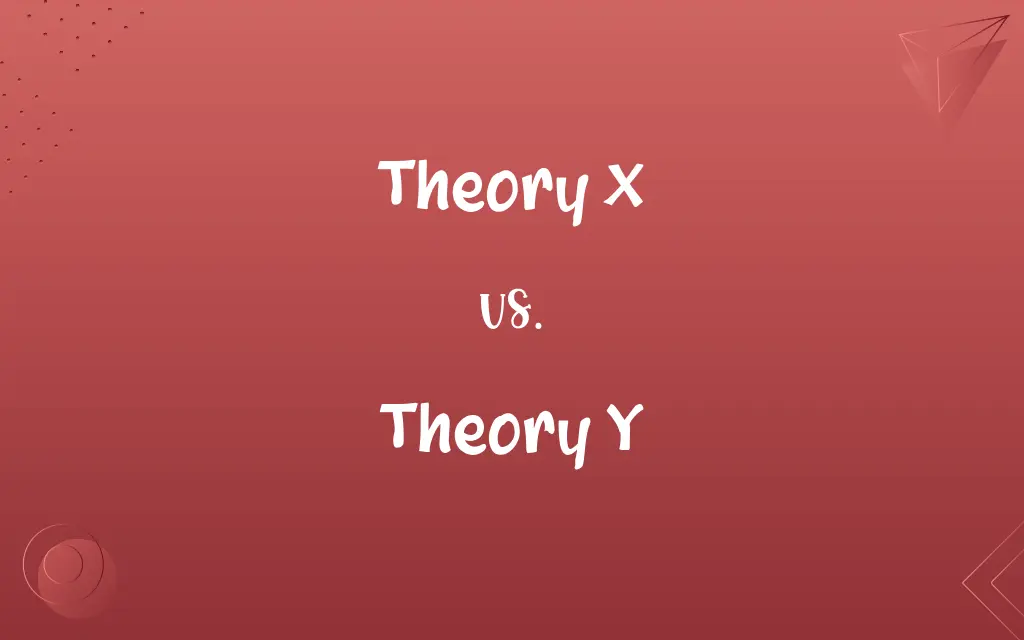Theory X vs. Theory Y: Know the Difference

By Shumaila Saeed || Published on January 15, 2024
Theory X assumes employees are inherently lazy and need control, while Theory Y views them as self-motivated and seeking responsibility.

Key Differences
Theory X is a management style assuming employees are inherently lazy, needing strict supervision and control. Conversely, Theory Y suggests employees are self-motivated and thrive on responsibility, requiring less oversight.
Shumaila Saeed
Jan 15, 2024
Under Theory X, managers believe workers have little ambition and avoid responsibility, leading to a more authoritarian style of management. In contrast, Theory Y posits that work is as natural as play if conditions are favorable, promoting a participative management style.
Shumaila Saeed
Jan 15, 2024
Theory X advocates for a highly structured work environment with clear rules and regulations, as it views employees as disliking work. However, Theory Y encourages a more relaxed work environment, believing employees seek and accept responsibility under the right conditions.
Shumaila Saeed
Jan 15, 2024
In Theory X, creativity in problem-solving is generally not expected from the average worker, leading to centralized decision-making. Theory Y, on the other hand, recognizes the potential creativity in all employees, supporting decentralized and consultative decision processes.
Shumaila Saeed
Jan 15, 2024
Theory X often results in short-term productivity but can lead to high employee turnover and dissatisfaction. Meanwhile, Theory Y, while potentially slower at implementing changes, often leads to higher employee satisfaction and long-term productivity gains.
Shumaila Saeed
Jan 15, 2024
ADVERTISEMENT
Comparison Chart
View of Employee Nature
Assumes employees dislike work
Believes employees find work natural
Shumaila Saeed
Jan 15, 2024
Work Environment
Highly structured with strict rules
Relaxed with room for self-direction
Shumaila Saeed
Jan 15, 2024
Creativity and Decision Making
Centralized, limited employee input
Decentralized, encourages employee input
Shumaila Saeed
Jan 15, 2024
Long-term Productivity
May lead to short-term gains but higher turnover
Focuses on long-term productivity and satisfaction
Shumaila Saeed
Jan 15, 2024
ADVERTISEMENT
Theory X and Theory Y Definitions
Theory X
Assumes workers avoid responsibility and lack ambition.
The manager's Theory X belief resulted in micromanagement.
Shumaila Saeed
Jan 05, 2024
Theory Y
Theory Y views employees as self-motivated and seeking responsibility.
Their Theory Y philosophy encouraged employee autonomy.
Shumaila Saeed
Jan 05, 2024
Theory X
Relies on external motivation and rewards for employees.
Using Theory X, they implemented a rigorous reward system for tasks.
Shumaila Saeed
Jan 05, 2024
Theory Y
Focuses on self-direction and fulfillment of employees.
With Theory Y, they nurtured a work environment fostering personal growth.
Shumaila Saeed
Jan 05, 2024
Theory X
Advocates for a top-down approach in decision making.
Theory X influenced their centralized decision-making policy.
Shumaila Saeed
Jan 05, 2024
ADVERTISEMENT
Theory Y
Encourages a decentralized approach in management.
Their Theory Y approach allowed for more employee input in projects.
Shumaila Saeed
Jan 05, 2024
Theory X
Theory X views employees as inherently lazy and needing control.
Under Theory X, the company enforced strict supervision to ensure productivity.
Shumaila Saeed
Jan 05, 2024
Theory Y
Believes in the intrinsic motivation and potential of employees.
Theory Y was evident in their trust in employee creativity.
Shumaila Saeed
Jan 05, 2024
Theory X
It's a management style emphasizing strict rules and oversight.
Their Theory X approach led to a highly structured workplace.
Shumaila Saeed
Jan 05, 2024
Theory Y
It promotes a participative management style.
Adopting Theory Y led to more democratic decision-making processes.
Shumaila Saeed
Jan 05, 2024
Repeatedly Asked Queries
Can Theory X lead to employee dissatisfaction?
Often, due to its controlling nature.
Shumaila Saeed
Jan 15, 2024
How does Theory X view employee ambition?
It views employees as having little to no ambition.
Shumaila Saeed
Jan 15, 2024
What is the core assumption of Theory X?
It assumes employees inherently dislike work and need external control.
Shumaila Saeed
Jan 15, 2024
Are rewards important in Theory X?
Yes, external rewards and punishments are key motivators.
Shumaila Saeed
Jan 15, 2024
How do employees typically respond to Theory X management?
Often with lower satisfaction and engagement.
Shumaila Saeed
Jan 15, 2024
Does Theory Y encourage team collaboration?
Yes, it fosters teamwork and participative decision-making.
Shumaila Saeed
Jan 15, 2024
How does Theory Y view employee potential?
It sees all employees as having potential for creativity and responsibility.
Shumaila Saeed
Jan 15, 2024
Is creativity encouraged in Theory Y?
Yes, it values and nurtures employee creativity.
Shumaila Saeed
Jan 15, 2024
Does Theory Y support flexible work policies?
Yes, it often aligns with flexible and autonomous work environments.
Shumaila Saeed
Jan 15, 2024
Does Theory X value employee feedback?
Generally, it places less emphasis on employee feedback.
Shumaila Saeed
Jan 15, 2024
How does Theory Y impact employee turnover?
It often leads to lower turnover due to higher employee satisfaction.
Shumaila Saeed
Jan 15, 2024
Is Theory X suitable for all work environments?
Not always, as it may stifle creativity and motivation in some settings.
Shumaila Saeed
Jan 15, 2024
Is decision-making decentralized in Theory Y?
Yes, it encourages shared decision-making.
Shumaila Saeed
Jan 15, 2024
Does Theory Y require a high level of trust in employees?
Yes, it's based on trust and a belief in employee self-direction.
Shumaila Saeed
Jan 15, 2024
Can a manager use both Theory X and Y?
Yes, though they are fundamentally different, a blend can be effective in certain contexts.
Shumaila Saeed
Jan 15, 2024
Does Theory X align with modern management practices?
It's less common in modern, employee-centric workplaces.
Shumaila Saeed
Jan 15, 2024
Can Theory Y be effective in all industries?
While beneficial, its effectiveness can vary based on industry and job nature.
Shumaila Saeed
Jan 15, 2024
Is employee well-being a focus of Theory Y?
Yes, employee satisfaction and well-being are central to Theory Y.
Shumaila Saeed
Jan 15, 2024
Are Theory X and Y mutually exclusive?
They represent opposite ends of a spectrum but can be blended in practice.
Shumaila Saeed
Jan 15, 2024
Can Theory X lead to high productivity?
It can, particularly in the short term or in task-oriented environments.
Shumaila Saeed
Jan 15, 2024
Share this page
Link for your blog / website
HTML
Link to share via messenger
About Author
Written by
Shumaila SaeedShumaila Saeed, an expert content creator with 6 years of experience, specializes in distilling complex topics into easily digestible comparisons, shining a light on the nuances that both inform and educate readers with clarity and accuracy.









































































